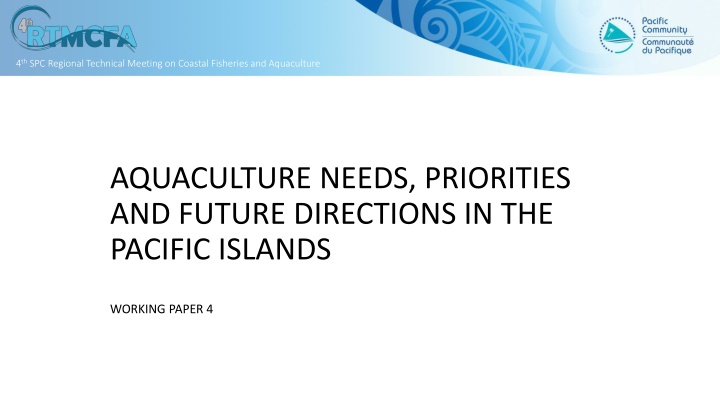
Enhancing Aquaculture Development and Management in Pacific Islands
"Explore the initiatives undertaken to enhance aquaculture development and management in the Pacific Islands, including capacity building, policy support, biosecurity management, training programs, and addressing challenges during COVID-19. Discover the progress made in regional and national capacity building, technical assistance provision, aquatic biosecurity management, and aquaculture training. Gain insights into the key focus areas and future directions in the aquaculture sector, highlighting the importance of addressing issues such as market impacts, supply chain disruptions, financial constraints, gender inclusivity, and skill availability."
Download Presentation

Please find below an Image/Link to download the presentation.
The content on the website is provided AS IS for your information and personal use only. It may not be sold, licensed, or shared on other websites without obtaining consent from the author. If you encounter any issues during the download, it is possible that the publisher has removed the file from their server.
You are allowed to download the files provided on this website for personal or commercial use, subject to the condition that they are used lawfully. All files are the property of their respective owners.
The content on the website is provided AS IS for your information and personal use only. It may not be sold, licensed, or shared on other websites without obtaining consent from the author.
E N D
Presentation Transcript
4thSPC Regional Technical Meeting on Coastal Fisheries and Aquaculture AQUACULTURE NEEDS, PRIORITIES AND FUTURE DIRECTIONS IN THE PACIFIC ISLANDS WORKING PAPER 4
ENHANCED REGIONAL AND NATIONAL CAPACITY IN POLICY AND PLANNING Technical assistance on new/review national aquaculture development and management plan Review of national regulations Development of aquaculture business investment strategies
PROVIDED TECHNICAL SUPPORT FOR AQUACULTURE Provided capacity development to government and farmers in feed, seed and broodstock management. Marine and freshwater hatchery trainings, feed research trials Support lead and cluster farmers to strengthen community impacts Strengthen extension support to farm clusters Mentoring and training to aquaculture enterprises Provided assistance with business literacy trainings Assistance with development of business plans Assisted with technological transfer Investigated value adding opportunity Provided small grant support to enterprises on a 60:40 co-sharing Market surveys Cost benefit analysis trainings
ENHANCE THE MANAGEMENT OF AQUATIC BIOSECURITY RISKS Regional framework on aquatic biosecurity endorsed by RFMM in 2020. Significant progress made with all 12 PICTs up to date on their annual aquatic disease reporting status to OIE. Screening of OIE listed diseases in PICTs Assistance with development of national aquatic biosecurity plans. Capacity development on aquatic biosecurity in members.
AQUACULTURE TRAINING The Aquaculture trainings accounted for around 35% of FAME Division trainings. Generic trainings: 39.4% women participants Enterprise training: 35.7% women participants
ISSUES Shifts in priority COVID has hit market hard, then no flights affecting imported PLs and exports. Availability of farm inputs affected to locked down. Limited access to finances and financial services. Since COVID, banks have tightened up financial lending schemes, hitting businesses and property transactions. Enterprise support we may need to rethink 60:40 split National OIE reporting in case of positive cases. How to encourage more women to aquaculture Capacity and technical skills Availability of farm inputs
SUSTAINABILITY OF AQUACULTURE Aquatic biosecurity Policy and governance Public private partnerships Capacity building Input supply
IMMEDIATE AQUACULTURE PRIORITIES AQUATIC BIOSECURITY AQUACULTURE INPUTS Identify members with the capacity to undertake role as a sub-regional aquatic biosecurity hub to strengthen aquatic biosecurity capacity sub-regionally Establish central distribution centres (regional or subregional hub) for broodstock, seed and feed for selected priority species to achieve economies of scale. Construct/upgrade aquatic biosecurity infrastructure to support regional or sub-regional roles and to increase capacity Construct/upgrade infrastructure and improve techniques to support regional or sub-regional roles
LONGER-TERM AQUACULTURE PRIORITIES Major new PICT aquaculture potential could yet be unlocked. Commodities and practices that are deemed climate smart and natured- based that are worthy of investment. PICT aquaculture focus in a post COVID- 19 world Integrated food systems approach
PROCESS FORWARD HoF 13 (1 4 June 2021) endorsed for SPC to address members on-going and immediate needs and priorities for the aquaculture and supported the development of a new regional strategy. Process underway for a regional assessment of the aquaculture sector that would provide recommendations for future directions. Given the shorter timeframe between the 13thHoF and the 4thRTMCFA, the expected output from the study cannot be presented for review at the 4thRTMCFA. Hence the inputs from delegates from the Breakout Group Session after this plenary will be useful directing the regional assessment work in terms of future directions
RECOMMENDATIONS Members and partners are invited to: a. Note the work already in progress for a regional aquaculture assessment, in line with the 13thHoF Outcome on future priorities for Pacific aquaculture development; b. Endorse the proposal in this paper that the expected output from the study will be presented at the 14thHoF for discussion, and that a draft regional aquaculture strategy will be developed by SPC and presented to RTMCFA5 for review before being presented to the 15thHOF for endorsement.
BREAKOUT GROUP SESSION - QUESTIONS 1. What broad topic areas in aquaculture do you suggest should be addressed in an assessment of the aquaculture needs, priorities and future directions in the region? 2. In each topic area, identify emerging issues, opportunities and required support for its development among PICT members.
